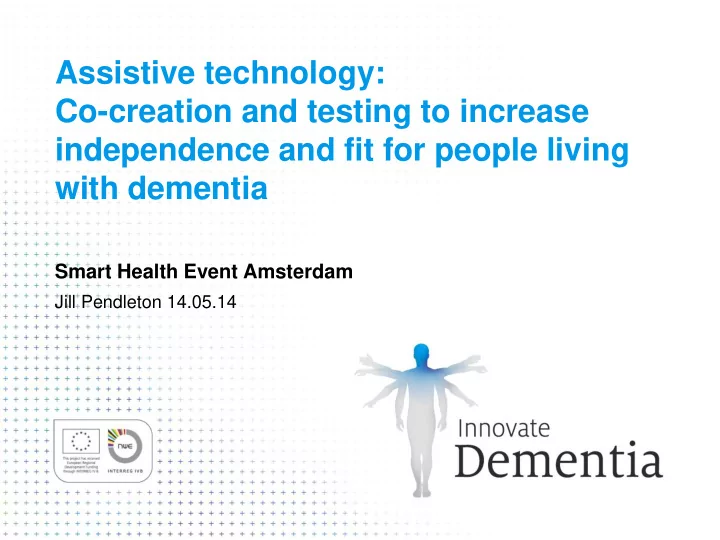

Assistive technology: Co-creation and testing to increase independence and fit for people living with dementia Smart Health Event Amsterdam Jill Pendleton 14.05.14
The moral obligation
The size of the problem • 35 million people are currently estimated to have dementia • 4.6 million new cases are diagnosed each year- 1 every 7 secs • 800 000 (approx) people living with dementia in the UK • £23 billion cost per annum to UK – 2xcancer, 3xheart disease,4x stroke • £27,647 per year to care for a person with dementia in UK • 2/3 people living in the community, 1/3 in care homes • Drive is to diagnose people earlier Figures www.gov.uk, Alzheimer’s Research Trust, Kings Fund
Solving the puzzle Community Innovation Smart economy and Development Technology
Technology and dementia • Why? - There is recognition that current methods of supporting people are economically unsustainable and not meeting need - People with dementia want to stay in one place – home and we need to get better at finding solutions to enable people with dementia to do that • Fit - Products go part of the way to enabling people to stay independent and safer longer- one of the reasons for this is lack of involvement of people living with dementia in design - Recent moves are towards co creation and production Telehealth and Telecare are not new but have not been fully exploited
Stand alone devices
Telecare Movement Detector Pillow Smoke Alert Detector Bogus Medication Dispenser Caller Telecare Video Flood Door detector Entry Carbon Fall Monoxide Detector Detector Gas Temperature Detector Extremes
Dementia Friendly Technology - a charter Alzheimer’s Society Life Enhancing – quality Safety- reducing areas Health- remote of risk monitoring of health of life and independence
Innovate Dementia: 3 year European funded project( Interreg IVB) • Aim: - To develop innovative care models and practices - Develop and test new or existing Academia technologies and innovative ways of living within the peoples real living environments - Test and evaluate innovative dementia care models, focusing Health and specifically on key elements of Business social care integrated care Sector
The Netherlands Partners United Kingdom Germany Belgium
Collaboration Boost Innovation Capitalise Create New on Existing Business Knowledge Transnationality Merge Identify Ideas Trends
Creating Collaboration - Liverpool Living Lab
• ‘ Ensuring that people living with dementia are central to and drive the innovation process, ‘user led partnerships’ is invaluable as people’s opinions regarding relevance and utility can not, and should not be replicated by professionals or developers, signifying the expertise of people living with dementia and challenging the perception of service users as passive recipients of care’ • The King’s Fund (2012) Experience -based co-design toolkit: working with patients to improve health care. http://www.kingsfund.org.uk/projects/point-care/ebcd (last accessed May 23 2013.)
Nutrition • Liveability – Exercise programme and film and • Schools • Meal positioning Exercise • Intelligent lighting within an dementia inpatient unit Lighting • Non pharmacological interventions Living • Co-creation projects: Memory enabling technologies, House environment of Memories, Tell Joan / Mylife • Bricolage • Lived experience Models of • Liverpool Football club assistance • Models of access films • Database
Living environments – memory enabling technologies… Co-design Co- creation Co-production Customisation
Our experience … • Huge learning curve - new concept for many - challenge our own knowledge and assumptions - knowledge of technology - business focused / NDAs / IP • In-depth learning about peoples needs and abilities • Need for an assessment before introducing people to the consumer marker • Need for governance framework-protocol around involvement
What we’ve learnt through co creation Simple is not Design is the key , always gadgets the best solution need to look what they are… If it doesn’t move I cant see it Am I hearing voices?
Feedback: ‘ Unbelievably they actually came to us Service Users when they were looking to design things to help improve the lives of people living with dementia, They called it innovation a new word for people with dementia.’ ‘For the first time something was going to be bespoke made for us rather than us having to fit what ever what was made you know like it or lump it.’ ‘It was fantastic for us as people with dementia to be give the opportunity to be given the chance to speak to the house of memories & designers and tell them what works and what doesn't work for us, but more importantly they listened, acted and then came back with the improvements we had ask.’ ‘It didn't matter what ideas we came up with they were all considered.’
Contact: For further information • Jill.pendleton@merseycare.nhs.uk www.innovatedementia.eu
Recommend
More recommend